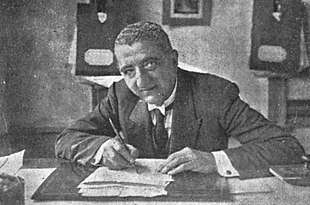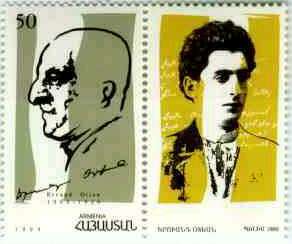Yervant Odian
Yervant Odian (Armenian: Երուանդ Օտեան or Երվանդ Օտյան) (Constantinople, Turkey, 19 September 1869 – Egypt 1926)[1] more known by his satire name "Comrade Panchooni" (Panchooni translating to 'one who has nothing[2]),[3] is considered to be one of the most influential Armenian satirists, along with the roughly contemporary Hagop Baronian. Odian was born into one of the most affluent families in what was then Constantinople (now modern day Istanbul).[2] His Paternal Uncle Krikor Odian (1834-1887) was a respected political figure and was even one of the founders and writers of the Armenian National Constitution.[2] His father too was a writer, along with having been a political diplomat and possibly most unique of all, a translator of Victor Hugo's.[2] Odian's mother was indeed wealthy on her side of the family as well.[2] Odian's writings, which include novels and short stories, often humorously point out humanity's vices. Odian's heritage played a major role in some of his major themes, those being Armenian-Turkish relations as well as Muslim-Christian relations.[4] Interestingly enough, Odian's grandfather Yazedje Boghos Agha was from Palu, Turkey, a town notable for its massive Armenian population, a major part of its destruction during the Armenian massacre events of the 1894-1896.[5] He had the unique ability to conceive of and write stories at any given instant. In a 2013 piece written by Eddie Arnavoudian, he proclaimed "Even if elsewhere equalled in modern Armenian literature, Odian's exposure of the establishment's putrid core has certainly not been bettered".[3] Odian's writing styles are often described as extroverted, as if his is removing his persona from the piece in order to best portray the truth.[2] Though Odian was surrounded by nearly all of the other great Armenian writers of his time, and friendly with many of them, their writing styles never altered his own, always staying true to his voice.[2]

| Born | September 19, 1869 Istanbul, Ottoman Empire |
|---|---|
| Died | 1926 (Age 56) Cairo, Egypt |
| Resting place | Cairo, Egypt |
| Occupation | Satirist, Journalist, Playwright |
| Parent(s) |
|
| Relatives |
|
History of Odian's Life
Early Life
Early in his life, Odian attended the Berberian School (Constantinople), where he fine tuned his love of the Armenian language as well as writing.[2] Over the course of his life, Odian would come to be fluent in a number of languages, French, Turkish, and Armenian to name a few.[2] Odian would follow his love of writing, a rather humble job for someone in his family's financial position, thanks to the support he received from his uncle, who was one of biggest influences during his upbringing.[2] Odian would even be elected Deputy of the Armenian National Assembly, this was major link for him to use sources for his literally works throughout his career.[2] Though Odian would seek a life as a political satirist through writing, he was never aligned specifically with any political party, rather he believed in free thought as being the most thorough and thoughtful process of understanding political issues.[2] [[File:Human remains from the massacre of the Armenians at
By 1896, before the massacres of Armenians in Constantinople concluded, Odian left his then home and traveled across Europe seeking asylum in places like Athens (Greece), Paris (France), Vienna (Austria), and London (England), even living for some time in Bombay (India), and finally Cairo (Egypt).[6] Many of these places now have strong Armenian diaspora as a result of the latter Armenian genocide.[7]
Later Life
Yervant Odian eventually returned home to Constantinople in 1909, where he took up more work as a writer.[6] In 1915, during the Armenian Genocide Odian was deported from Istanbul to the Syrian desert. He was able to avoid falling victim by becoming a translator for German officials in Deir ez-Zor since he knew French and Turkish. Sometime during his exile, while in Homs, Syria, Odian converted to Islam, against his traditional Christian background, possibly as a result of the terror he experienced during persecution.[8] Yervant's horror of the events of the Armenian genocide pushed him to write for sake of awareness, his memoirs.[2] In 1918, after World War I, he took up the responsibility of collecting orphans left over from deportations in the deserts of Syria and placing them in orphanages. His only real source of income was through his writing, as he was working for the Jamanak, currently the longest continuously running daily Armenian language newspaper in the world.[9] It was here where he published his memoirs beginning in 1919 of his time in exile during the Armenian Genocide.[9] He left Constantinople in 1922 and lived in Bucharest and various locations in the Near East. The Armenian Genocide would last until 1923, at which point an estimated 1.5 million Armenians had lost their lives to the destruction from the Ottoman Empire and Turkish Republic forces. Yervant Odian was an avid and heavy drinker, this vice would eventually prove fatal.[2] Yervant Odian spent the last days of his life in Cairo, Egypt where he was buried at the age of 56.
Post Death and Legacy
Even nearly a century after his death, his work lives on thanks to support from the Armenian community, largely from Armenian Genocide remembrance groups. In late 2011 the Armenian Genocide Benevolent Union's Ardavazt Theatre Company performed Yervant's 'Ser yev Dzidzagh' (Love and Laughter), a satirical comedy focused around three revolving plots all used in junction with one another in order to portray an accurate image of 19th century Armenian society.[10] In 2016 the Armenian Museum of Fresno celebrated the 150th birthday of Odian by hosting an event focused on his life and his literary works.[11]
As of 2019, the Armenian Genocide is only formally recognized in a mere 32 countries, with Turkey, the country which committed the genocide, not being one of these.[12] The two countries still remain at odds, though not in the violent ways of the early 20th century. The suggestion that the Armenian genocide took place is inherently against the law in modern day Turkey. Even today the term "Armenian" is considered a vulgar insult in Turkish society.
.djvu.jpg)


Works
- Accursed Years. My Exile and Return from Der Zor, 1914-1919, Garod Books, London 2009
- Comrade Clueless (Ընկեր Փանջունի), Constantinople, from 1914 on (several books)
(also a Turkish edition published as 'Yoldaş Pançuni' by Aras Pub.in 2008) ISBN 978-975-7265-32-0 [13]
- Twelve Years Out of Istanbul. 1896-1908 (Տասներկու Տարի Պոլսէն Դուրս. 1896-1908), Constantinople 1922 (Reminiscences)
References
- Kermanikian, Mesrob (Summer 1961). "Yervant Odian" (PDF). Ararat. Retrieved 8 October 2011.
- acam-france.org http://acam-france.org/bibliographie/auteur.php. Retrieved 2019-11-18. Missing or empty
|title=(help) - "ANN/Groong -- TCC - 'Family, Honour, Morality' by Yervant Odian - Eddie Arnavoudian". groong.usc.edu. Retrieved 2019-11-18.
- Guerguerian, Krikor (2018-04-02). "Odyan 02". Yervant Odyan.
- "Maps| Vilayet of Diyarbekir| Palu| Locale| Population movements:: Houshamadyan - a project to reconstruct Ottoman Armenian town and village life". www.houshamadyan.org. Retrieved 2019-11-18.
- "Yervant Odian". www.goodreads.com. Retrieved 2019-11-18.
- "Armenian diaspora", Wikipedia, 2019-11-13, retrieved 2019-11-18
- Georgelin, Hervé (March 2008). "Perception of the other's fate: what Greek Orthodox refugees from the Ottoman Empire reported about the destruction of Ottoman Armenians". Journal of Genocide Research. 10 (1): 59–76. doi:10.1080/14623520701850310. ISSN 1462-3528.
- "Yervant Odian". www.bibliomonde.com. Retrieved 2019-11-18.
- "AGBU Ardavazt Continues Long String of Successful Performances with Yervant Odian's "Ser Yev Dzidzagh"". AGBU | Armenian non-profit organization. Retrieved 2019-11-18.
- "Yervant Odian: 150th Birthday Celebration (1869-1926)". Armenian Museum of Fresno. Retrieved 2019-11-18.
- "Armenian Genocide recognition", Wikipedia, 2019-11-15, retrieved 2019-11-18
- Aras Pub. web site
External links
- Zavallin (The Pitiful One). One of his plays written in Armenian.
- https://www.google.com/imgres?imgurl=https%3A%2F%2Fupload.wikimedia.org%2Fwikipedia%2Fcommons%2F9%2F96%2F%25D4%25B5%25D6%2580%25D5%25BE%25D5%25A1%25D5%25B6%25D5%25A4_%25D5%2595%25D5%25BF%25D5%25B5%25D5%25A1%25D5%25B6.jpg&imgrefurl=https%3A%2F%2Fwww.wikidata.org%2Fwiki%2FQ1054731&docid=A3raZzFB-YAQ3M&tbnid=B2ffohOUnuNUsM%3A&vet=10ahUKEwjWltCJnvPlAhUxU98KHWo0C34QMwhAKAIwAg..i&w=436&h=600&bih=798&biw=1440&q=yervant%20odian&ved=0ahUKEwjWltCJnvPlAhUxU98KHWo0C34QMwhAKAIwAg&iact=mrc&uact=8
- https://www.google.com/imgres?imgurl=http%3A%2F%2Fwww.armof.org%2Fwp-content%2Fuploads%2F2019%2F04%2Fodian-yervant.0.jpg&imgrefurl=http%3A%2F%2Fwww.armof.org%2Fevent%2Fyervant-odian-1869-1926%2F&docid=ncb7bvBPT6rYTM&tbnid=1MnkBzt-NlE84M%3A&vet=10ahUKEwjWltCJnvPlAhUxU98KHWo0C34QMwhCKAQwBA..i&w=305&h=194&bih=798&biw=1440&q=yervant%20odian&ved=0ahUKEwjWltCJnvPlAhUxU98KHWo0C34QMwhCKAQwBA&iact=mrc&uact=8
| Armenian Wikisource has original text related to this article: |